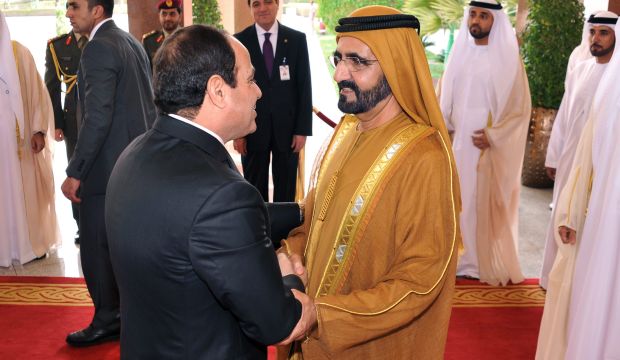
Sheikh Mohammed Bin Rashid Al Maktoum, Vice-President and Prime Minister of the UAE (R), shakes hands with Egyptian President Abdel-Fattah El-Sisi (L), at the Al-Mushrif Palace, Abu Dhabi, on January 18, 2015. (EPA/Office of Egyptian Presidency/HO)
Abu Dhabi, Asharq Al-Awsat—Regional efforts to combat terrorism, the situation in Libya and Emirati investment in Egypt were among the most pressing matters discussed by Egyptian President Abdel-Fattah El-Sisi and the leaders of the UAE during Sisi’s two-day visit to the Gulf country, informed sources said on Sunday.
In his first official visit to the UAE since coming to power last July, Sisi met on Sunday with Sheikh Mohammed Bin Rashid Al Maktoum, ruler of Dubai and Vice President and Prime Minister of the UAE, as well as Sheikh Mohammed Bin Zayed Al Nahyan, Crown Prince of Abu Dhabi and Deputy Supreme Commander of the UAE Armed Forces.
Sheikh Mohammed Bin Rashid said the help the UAE has offered Egypt during the past two years was due to his country’s “historic responsibility” to Egypt, and not a result of any particular events. The president of the UAE, Abu Dhabi’s Emir Khalifa Bin Zayed Al Nahyan, was keen to strengthen the already warm relationship between both countries, he added.
For his part, Sisi thanked the UAE for its help, saying Egypt would “never forget” the assistance and support offered by the Gulf country during the difficult period it experienced following the ouster of former president Mohamed Mursi in July 2013. He also called on the UAE’s leaders to continue to support Egypt and the Egyptian people, especially in a number of economic, social and developmental sectors.
Following the meeting, Sisi attended an event in which he met with some of the UAE’s business and investment community, telling attendees during his opening speech that he believed his country offered them a number of highly lucrative opportunities.
He added that Egypt’s government alone would not be able to fulfill all the country’s economic aspirations. “It is here that the role of investors from Egypt, from our brothers in the Arab world, and from other parts of the world in helping uplift the Egyptian economy becomes clear.”
He also assured investors that his government was keen to make the legal environment in Egypt more conducive to foreign direct investment.
“Egypt is working on removing the difficulties and obstacles which foreign investors have faced in the country for the last four years, when investment in Egypt was not an attractive prospect due to bureaucratic impediments and the need to bribe officials in order to obtain investment permits,” he said.
After the meeting the president listened to comments from a number of Emirati investors about their experiences investing in Egypt and to some of their suggestions regarding how the process could be improved from their point of view.
Most comments focused on the need for a new investment law in the country that meets the needs of Arab and foreign investors, as well as mechanisms to help resolve ongoing disputes which a number of Emirati companies with funds in Egypt are involved in.
